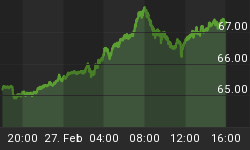Despite the fact that the Fed still believes that a recession is unlikely to occur, Bernanke & Co. followed up on last week's emergency 75 basis point rate cut with a 50 basis point kicker on Wednesday. Not to be outdone by the Fed's generosity, the House of Representatives and the Bush Administration slapped together a $150 billion "stimulus package", which can only be delayed by the Senate's desire to join in the bead throwing. On Wall Street these actions were cheered as heroic, with praise and accolades for all (what could be more politically courageous than handing out free money in an election year.) In a recent poll, fully 78% of economists thought these policies were appropriate...while 18% thought that they were not aggressive enough.
A common definition of insanity is the act of repeating the same activity while expecting a different result. Bernanke is now repeating the same mistakes made by Greenspan, yet he and almost everyone on Wall Street expect a different result. The stock market bubble of the 1990s resulted from interest rates being too low, which sent false signals to businesses, causing them to over-invest in information technology, telecom, and dot coms. When that bubble burst, rather than allowing the corrective recession to run its course, the Fed responded by slashing interest rates. The result was an even larger bubble in real estate; causing consumers too borrow far too much money to buy houses and other goodies.
Now that the housing bubble has burst, the Fed is once again slashing interest rates to postpone the pain. However, in order to correct for years of extravagant borrowing and spending, the country is in desperate need of a period of saving and economizing. But by rewarding debtors and punishing savers, lower interest rates actually encourage the opposite behavior. Given how much harm this strategy has already done in the past why should we assume it will work any better now?
Consider a real world example. Suppose your spendthrift neighbor, maxed out on credit card and home equity debt, no savings in the bank, struggling to make ends meet and one paycheck away from foreclosure and personal bankruptcy, comes to you for financial advice regarding what to do with the $1,200 he received in the Federal Stimulus Lottery? Would your advice be to "go out and buy yourself a brand new plasma T.V."? My guess is that you would suggest he pay down his debts. If you were a good friend you might help him devise a budget to put his financial house back in order. Such a plan might include trading in his Mercedes SUV for a more fuel efficient Honda, brown bag lunches instead of expensive restaurants, tearing up department store charge cards, cancelling vacations, cutting back premium cable channels, etc. When you are neck deep in debt, the solution is to economize, ratchet down your lifestyle and repair your personal balance sheet. In other words, you go though your own personal recession.
Would your advice be any different if it was not just one neighbor asking but 300 million? If it's wrong for an overly-indebted individual to blow a windfall, it's just as wrong if millions of us do it collectively. If our economy is already suffering from too much debt, think of how much worse off we will be after we blow thought these rebate checks.
Or think about it this way -- Imagine an obese individual showing up at a Weight Watchers meeting and his counselor handing him a box of Twinkies? How much weight do you think would be lost on the "Twinkie diet?" American consumers have basically stuffed themselves almost to the point of explosion. What is needed is salad; not more Twinkies.
Ironically of course, by blowing up both the stock market bubble in the 1990s and the real estate bubble that followed, Greenspan actually repeated the same mistakes that previous Fed chairmen Benjamin Strong and William McChensey Martin made in the 1920s and the 1960s respectively. It seems sanity is a major disqualification for central bankers.
For a more in depth analysis of our financial problems and the inherent dangers they pose for the U.S. economy and U.S. dollar denominated investments, read my new book "Crash Proof: How to Profit from the Coming Economic Collapse." Click here to order a copy today.
More importantly, don't wait for reality to set in. Protect your wealth and preserve your purchasing power before it's too late. Discover the best way to buy gold at www.goldyoucanfold.com, download my free research report on the powerful case for investing in foreign equities available at www.researchreportone.com, and subscribe to my free, on-line investment newsletter at http://www.europac.net/newsletter/newsletter.asp.















